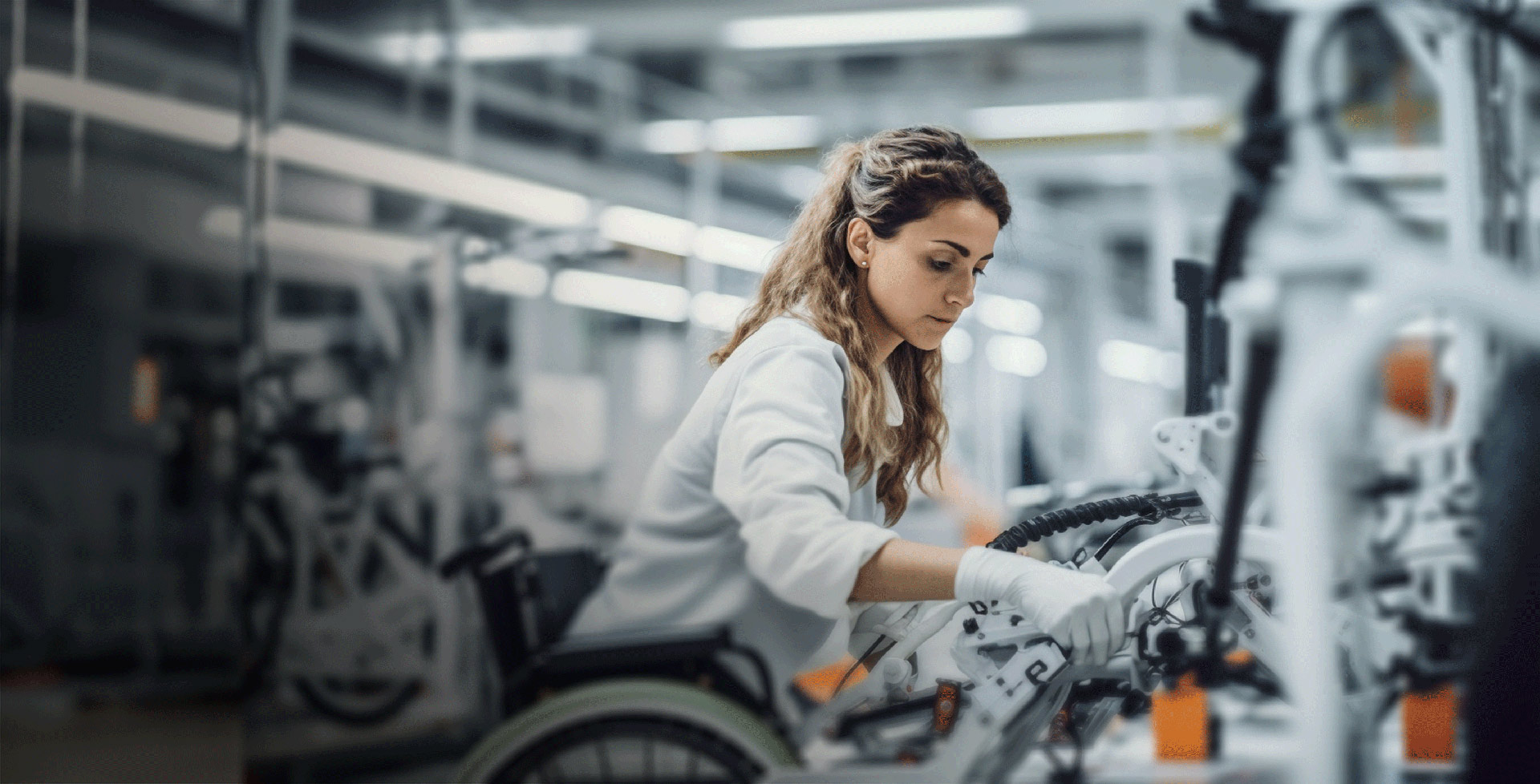How a Bike Factory is Boosting Sustainability and Inclusivity
3 minutes
28th of November, 2023

France, host of the renowned Tour de France and legendary birthplace of the pedal cycle, is now championing sustainability and workplace inclusivity with the help of Akkodis at a bicycle factory in Western France.
A Partnership for Change
Akkodis has been working with APF Entreprises (APFE), part of APF, a national organization that promotes the inclusion of people with disabilities in the workplace. The two teamed up in 2022 to create a specially adapted, inclusive factory space for workers with disabilities to assemble bicycles of all kinds, tapping right into the growing green mobility revolution.
Cycling: A Sustainable Choice
Europe’s green transport market is booming, as citizens seek ways to limit their environmental footprint and take better care of their own health. Cycling ticks all the boxes, with battery-powered bikes a particularly versatile solution. They’re greener than a car, but thanks to their batteries, more practical than a standard bicycle, particularly when it comes to hilly routes or long distances.
Manufacturing boost
APFE, seeing the rising demand, approached Akkodis for assistance. They initially considered a skills-based sponsorship, a French legal initiative where employees aid social causes. However, the project's magnitude soon outgrew this approach.
“It was too complicated a project to manage it via skills sponsorship, but APFE had a budget for this transformation, so we put forward a plan,” says Laurent Chaput, Technology Offering Manager at Akkodis.
The first step was a feasibility study. “We have a lot of experience in production lines – we’ve worked with many major manufacturers across different sectors,” he adds.
The APFE project was on a much smaller scale, but the principles were the same – setting out a plan for the production, logistics, storage, and electrical and airflow supply for machines at the site before turning the plan into a reality.
Initially, the team carried out feasibility studies for a 5,000m2 building based on APFE’s ambition to produce 200,000 bicycles per year. However, funding issues meant the project had to be adapted and APFE decided to shift the plans to a space on its own site, a former factory for which there was no historical data.
Revising the plan
The team had to revise its implementation study for the bicycle assembly line, as well as reconsider the logistics. This included the flows to supply the production line, delivery of raw materials, storage of finished bikes, and preparation areas for assembly line workers.
Their simulations helped establish that a production rate of 80,000 bikes (standard mountain and city bikes, children’s bikes, and electric bicycles) per year was the maximum the new space would allow. This took into account factors including the positions of each workstation on the production line and the storage areas.
As the production line's construction started, Akkodis assessed the site's needs for compressed air and electricity. Finding the existing electrical system inadequate and poorly documented, the team developed a new, custom-built network.
Surfing the cycling wave
As well as promoting social inclusivity and green transport, launching the production of high-tech electric bicycles in France boosts the local economy. Crucially, the space needed to allow for the company’s staff, no matter their disability, to focus on their work assembling bicycles.
A Workspace Tailored for Inclusivity
Taking part in a project that helps encourage greater inclusivity was important. “There is a strong culture of inclusivity within Akkodis on everything from gender and sexual orientation to social diversity and disability,” Chaput says.
The team came up with a specially adapted workspace for 14 AFPE employees, which is just as productive as a standard assembly line. “We researched the specific requirements of employees with disabilities and came up with plans to fit anti-fatigue work mats, practical and light accessories, and in some cases, specially adapted seats,” says Akkodis Project Manager Thierry Créach, who led the project.
The new factory was inaugurated in July 2023 and allows APFE to showcase its expertise in including people with disabilities in the workforce. APFE is not stopping there. It also wants to work on the renovation and reuse of public-hire bicycles to improve its environmental footprint.
The Olympic Spotlight and Beyond
With the 2024 Olympic and Paralympic Games set to shine a spotlight on France next year, the company wants to start producing electric tricycles suitable for wheelchair users.
After APFE obtained a license to assemble electric tricycles, Akkodis managed to integrate the new plan into the overall set-up at the production site, using 3D modeling software to map out the changes before they became a reality.
APFE now has plans to present 15 of the electric tricycles at the Paralympic Games and a long-term target of producing 1,500 per year.